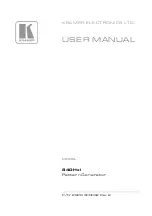
SECTION 8 |
Installation
33
8.4 DC SIDE CONNECTIONS
8.4.1 Preventing DC Input Over Voltage
It is to be ensured that the DC input voltage of this unit does not exceed 16.5 VDC
for the 12V battery versions and 33.0 VDC for the 24V battery versions to prevent
permanent damage to the unit. Please observe the following precautions:
- Ensure that the maximum charging voltage of the external battery charger /
alternator / solar charge controller does not exceed 16.5 VDC for the 12V battery
version and 33.0 VDC for the 24V battery version.
- Do not use unregulated solar panels to charge the battery connected to this unit.
Under open circuit conditions and in cold ambient temperatures, the output of the
solar panel may be > 22 VDC for 12V nominal panel and > 44V for 24V nominal
panel. Always use a charge controller between the solar panel and the battery.
- When using Diversion Charge Control Mode in a charge controller, the solar / wind
/ hydro source is directly connected to the battery bank. In this case, the controller
will divert excess current to an external load. As the battery charges, the diversion
duty cycle will increase. When the battery is fully charged, all the source energy
will flow into the diversion load if there are no other loads. The charge controller
will disconnect the diversion load if the current rating of the controller is exceeded.
Disconnection of the diversion load may damage the battery as well as the inverter
or other DC loads connected to the battery due to high voltages generated during
conditions of high winds (for wind generators), high water flow rates (for hydro
generators). It is, therefore, to be ensured that the diversion load is sized correctly
to prevent the above over voltage conditions.
- Do not connect this unit to a battery system with a voltage higher than the rated
battery input voltage of the unit (e.g. do not connect the 12V version of the unit to
24V or 48V Battery System).
8.4.2 Preventing Reverse Polarity on the DC input Side
CAUTION!
Damage caused by reverse polarity is not covered by warranty!
!
When making battery connections on the input side, make sure that
the polarity of battery connections is correct (Connect the Positive of
the battery to the Positive terminal of the unit and the Negative of the
battery to the Negative terminal of the unit). If the input is connected in
reverse polarity, DC fuse(s) inside the inverter will blow and may also cause
permanent damage to the inverter.
















































